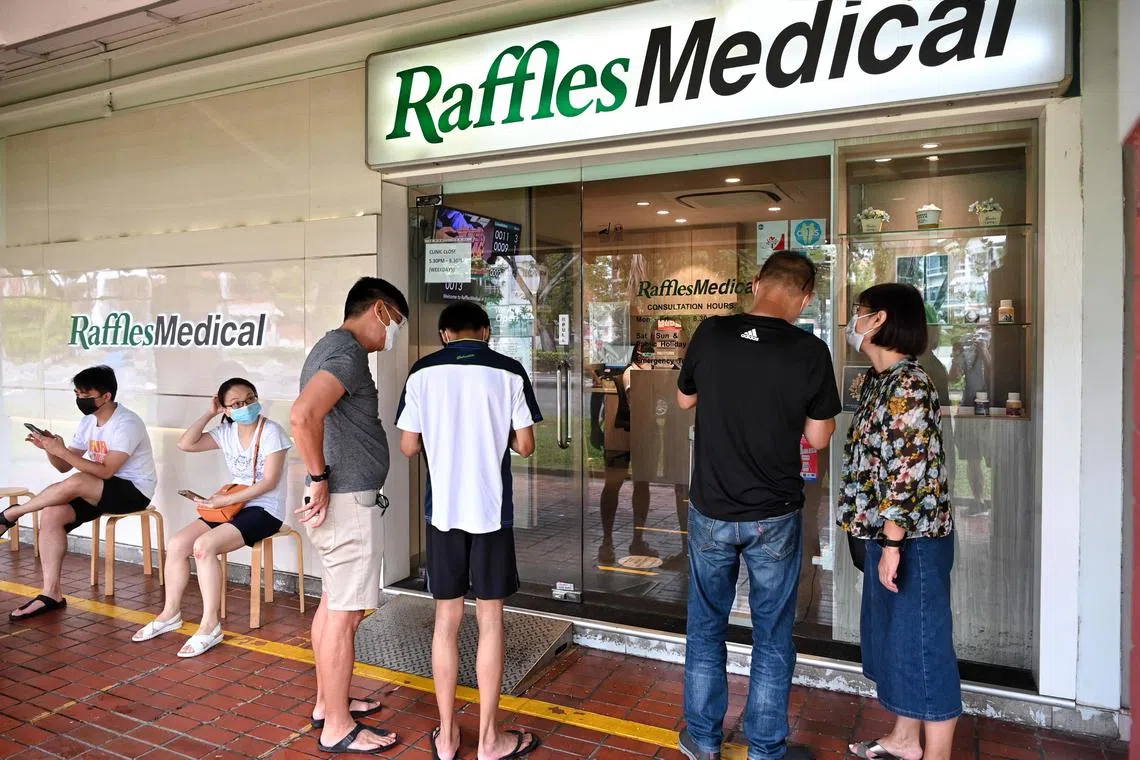GPs upgrading to smart clinic management systems for Healthier SG
Sign up now: Get ST's newsletters delivered to your inbox

Clinics from Raffles Medical Group have joined Healthier SG, which will start in July with those aged 60 and above.
PHOTO: ST FILE
SINGAPORE – General practitioners (GPs) keen on being a part of Healthier SG (HSG),
The pen-and-paper doctor is going the way of the dinosaurs, but the speed at which he does so may be hastened by the impending July launch of Healthier SG, which aims to shift the gravity of care from the hospitals to the community.
As at April 10, five clinic management system (CMS) vendors are on track to getting their systems to be HSG-compatible by end-May, according to the website of Singapore’s health tech agency, Integrated Health Information Systems (IHiS).
A CMS is software that assists with the tasks of running a practice, such as managing patients’ records, queues, prescriptions, inventory and payments.
To be compatible with HSG, a CMS needs to be integrated with the National Electronic Health Records (NEHR) – a “one patient, one health record” system that collects patient records from different providers such as GP clinics, specialist clinics and hospitals. NEHR was established in 2011, but the private sector has been slow to participate. Concerns have also been raised over privacy.
The CMS also needs to be integrated with the HSG platform so that doctors can use the system for various tasks such as enrolling patients, recording health plans, making referrals and submitting data to the Government.
In addition, it must be linked to the Community Health Assist Scheme (Chas) and meet cyber-security requirements as well, among other requirements.
In mid-April, Health Minister Ong Ye Kung said about 800 GP clinics, including those from major group practices such as Raffles Medical Group, have joined HSG, which will start in July with those aged 60 and above.
There are more than 1,600 GP clinics here.
While GP clinics using the systems that are set to be fully compatible with HSG can simply upgrade to the new version, others on older systems will have to migrate to a new system.
CMS vendors have been holding demonstrations of their HSG systems for GPs. At Assurance Technology, which offers the Clinic Assist system, about 200 of more than 500 GP clinics in its client base have signed up for the HSG version, said founder Peter Hong.
He added that he has more developers working on this version as it is a multi-year project that requires updates.
A spokesman for a new player, Galen Health, an offshoot of Healthway Medical Group, said 57 GP clinics that are on HSG are using its CMS. Another five will come on board soon, and it is talking to more.
The other CMS operators that have integrated with the NEHR system as at April 10 are IHiS, SG iMED and Plato Medical.
A CMS can cost some $200 to $300 or more per month per consultation room. To encourage GPs to go high-tech, the Government is giving them a one-off grant to offset the costs of IT adoption.
Benefits of going digital
Dr Sean Quek, a family physician at the Frontier Healthcare clinic in Jurong West that uses IHiS’ GPConnect system, said digitalisation is inevitable, with or without HSG. The question is whether GPs will adopt the HSG-compatible CMS or use another system, he added.
Some older doctors use handwritten notes, which might not be legible. “This can be an issue if another doctor is referring to the notes or if they are required in court as evidence,” said Dr Quek, 32.
With technology, trends of patients’ blood sugar levels, for example, can be captured and shown to them to help them understand their condition better, he noted.
“Using the CMS, patients will be able to look through their results on the phones – via HealthHub – and this will motivate patients to take charge of their own health.”
He added that if the patient needs to do a blood test at the GP clinic, the results can be accessed by a hospital specialist via an HSG CMS.
“When I was working at the hospital, we sometimes needed to repeat blood tests when the patient cannot provide the results. We will ask them, ‘what tests have you done?’, but sometimes they don’t know,” he noted.
One thing that Dr Philip Koh, Healthway Medical Group’s medical board chairman, likes about the Galen Health CMS is that it can automatically capture blood test results from the labs. “So I don’t have to key in the results manually,” he said.
The system is also configured to remind the doctor to recommend that the patient do his or her blood test, for instance.
More administrative work and hassle
But some GPs, particularly those who work solo or are in small practices, worry about the administrative work that will come with being a part of HSG, said Dr Koh.
Also, older doctors may not be as IT-savvy as the younger ones, though it could be a matter of time before they get used to the changes, he added.
Dr Quek Koh Choon, 74, who has been practising in Bedok North for about 40 years, said the Ministry of Health has looked into various ways to help clinics computerise and be ready for HSG.
“But for doctors who are not so savvy in IT, it is still a hassle,” he added.
It is harder for solo GP practices, and even those who are using computerised systems will need to upgrade. They must also have a CMS that can handle financial transactions like payment as well as use of Chas subsidies and MediSave claims, he said.
Healthier SG clinics also need to be part of a primary care network.
“In the light of all these (requirements), many older solo GPs, who still can contribute significantly, (have) opted not to join HSG,” said Dr Quek Koh Choon. Instead, they are prepared to retire or lose some patients who have been with them for many years.
He is embracing change. “I have to hire an IT manager to assist me. My old patients requested me to continue to manage their medical problems,” he added.
According to IHiS’ website, the Galen Health CMS targets to be HSG-compatible on May 5. Four systems that appear more ready than the rest have targeted a launch date of May 15, and another aims to be ready on May 31.
May is when those aged 40 and above and have chronic diseases can pre-enrol with their existing GPs, ahead of HSG’s July launch.
When Healthier SG is rolled out,



